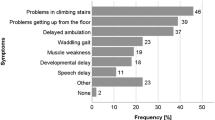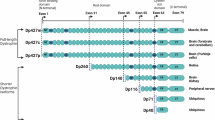Abstract
The delayed diagnosis of Duchenne muscular dystrophy (DMD) may be an ongoing problem internationally. We aimed to ascertain age at diagnosis and explore parents’ experiences of the diagnosis of DMD in Australia. Using mixed methods, data were collected from laboratory and clinical record audits of testing for DMD in Victoria and Tasmania, interviews and a national survey of parents regarding their experiences from first noticing symptoms to receiving a diagnosis. The audits revealed that the median age at diagnosis for DMD was 5 years (n=49 during 2005–2010); this age had not changed substantially over this period. Fourteen parents interviewed reported age at diagnosis ranging from 2 to 8 years with a 6 month to 4 year delay between initial concerns about their child’s development and receiving the DMD diagnosis. Sixty-two survey respondents reported the median age at diagnosis was 3 years and 9 months, while the median age when symptoms were noticed was 2 years and 9 months. Parents experienced many emotions in their search for a diagnosis and consulted with a wide range of health professionals. Half the survey respondents felt that their child could have been diagnosed earlier. Despite advances in testing technologies and increasing awareness of DMD, the age at diagnosis has remained constant in Australia. This mixed methods study shows that this diagnostic delay continues to have a negative impact on parents’ experiences, places families at risk of having a second affected child and may have a deleterious effect on affected children’s treatment.
Similar content being viewed by others
Log in or create a free account to read this content
Gain free access to this article, as well as selected content from this journal and more on nature.com
or
References
Emery AE : Population frequencies of inherited neuromuscular diseases–a world survey. Neuromuscul Disord 1991; 1: 19–29.
Emery AEH, Emery MLH : The History of a Genetic DIsease: Duchenne Muscular Dystrophy or Meryon's DIsease, 1st edn. London: Royal Society of Medicine Press, 1995.
Muntoni F, Wells D : Genetic treatments in muscular dystrophies. Curr Opin Neurol 2007; 20: 590–594.
Bushby K, Finkel R, Birnkrant DJ et al: Diagnosis and management of Duchenne muscular dystrophy, part 1: diagnosis, and pharmacological and psychosocial management. Lancet Neurol 2010; 9: 77–93.
Cyrulnik SE, Fee RJ, De Vivo DC, Goldstein E, Hinton VJ : Delayed developmental language milestones in children with Duchenne's muscular dystrophy. J Pediatr 2007; 150: 474–478.
Murray JM, Davies KE, Harper PS, Meredith L, Mueller CR, Williamson R : Linkage relationship of a cloned DNA sequence on the short arm of the X chromosome to Duchenne muscular dystrophy. Nature 1982; 300: 69–71.
Emery AEH (ed): Duchenne Muscular Dystrophy, 2nd edn. Oxford, New York: Oxford University Press, 1987.
Helderman-van den Enden ATJM, Madan K, Breuning MH et al: An urgent need for a change in policy revealed by a study on prenatal testing for Duchenne muscular dystrophy. Eur J Hum Genet 2013; 21: 21–26.
Firth M, Gardner-Medwin D, Hosking G, Wilkinson E : Interviews with parents of boys suffering from Duchenne muscular dystrophy. Dev Med Child Neurol 1983; 25: 466–471.
Read L, Galasko CS : Delay in diagnosing Duchenne muscular dystrophy in orthopaedic clinics. J Bone Joint Surg Br 1986; 68: 481–482.
Bushby KM, Hill A, Steele JG : Failure of early diagnosis in symptomatic Duchenne muscular dystrophy. Lancet 1999; 353: 557–558.
Zalaudek I, Bonelli RM, Koltringer P, Reisecker F, Wagner K : Early diagnosis in Duchenne muscular dystrophy. Lancet 1999; 353: 1975.
Mohamed K, Appleton R, Nicolaides P : Delayed diagnosis of Duchenne muscular dystrophy. Eur J Paediatr Neurol 2000; 4: 219–223.
Ciafaloni E, Fox DJ, Pandya S et al: Delayed diagnosis in duchenne muscular dystrophy: data from the Muscular Dystrophy Surveillance, Tracking, and Research Network (MD STARnet). J Pediatr 2009; 155: 380–385.
Laing NG : Multiplicity of experimental approaches to therapy for genetic muscle diseases and necessity for population screening. J Muscle Res Cell Motil 2008; 29: 247–252.
Wells DJ : Therapeutic restoration of dystrophin expression in Duchenne muscular dystrophy. J Muscle Res Cell Motil 2006; 27: 387–398.
Kakulas BA : Problems and potential for gene therapy in Duchenne muscular dystrophy. Neuromuscul Disord 1997; 7: 319–324.
Creswell JW, Plano Clark VL : Designing and Conducting Mixed Methods Research, 2nd edn. Thousand Oaks: Sage Publications, 2007.
Hansen EC : Successful qualitative health research: a practical introduction. NSW, Australia: Allen & Urwin, 2006.
Corbin J, Strauss A : Basics of Qualitative Research: Techniques and Procedures for Developing Grounded Theory, 3rd edn. Thousand Oaks: Sage, 2007.
McDonald CM, Han JJ, Mah JK, Carter GT : Corticosteroids and Duchenne muscular dystrophy: does earlier treatment really matter? Muscle Nerve 2012; 45: 777–779.
Ricotti V, Ridout DA, Scott E et al: Long-term benefits and adverse effects of intermittent versus daily glucocorticoids in boys with Duchenne muscular dystrophy. J Neurol Neurosurg Psychiatr 2013; 84: 698–705.
Firth MA : Diagnosis of Duchenne muscular dystrophy: experiences of parents of sufferers. Br Med J 1983; 286: 700–701.
Eilers R, Kleinveld JH, Vroom E, Westerman MJ, Cornel MC, Plass AMC : Desirability of early identification of Duchenne Muscular Dystrophy (DMD): parents' experiences of the period prior to diagnosis. Eur J Hum Genet 2010;18 (Supp 1): 373–374.
Bailey DB, Skinner D, Hatton D, Roberts J : Family experiences and factors associated with the diagnosis of fragile X syndrome. J Dev Behav Pediatr 2000; 21: 315–321.
Bourke E, Snow P, Herlihy A, Amor D, Metcalfe S : A qualitative exporation of mothers’ and fathers’ experiences of having a child with Klinefelter syndrome and the process of reaching this diagnosis. Eur J Hum Genet 2014; 22: 18–24.
Lawton S, Hickerton C, Archibald AD, McClaren BJ, Metcalfe SA : A mixed methods exploration of families’ experiences of the diagnosis of childhood spinal muscular atrophy. Eur J Hum Genet 2014, ; e-pub ahead of print 30 July 2014 doi:10.1038/ejhg.2014.147.
Bellman M, Byrne O, Sege R : Developmental assessment of children. Br Med J 2013; 346: e8687.
Parsons EP, Clarke AJ, Bradley DM : Developmental progress in Duchenne muscular dystrophy: lessons for earlier detection. Eur J Paediatr Neurol 2004; 8: 145–153.
Mendell JR, Shilling C, Leslie ND et al: Evidence-based path to newborn screening for Duchenne muscular dystrophy. Ann Neurol 2012; 71: 304–313.
Ross LF : Screening for conditions that do not meet the Wilson and Jungner criteria: the case of Duchenne muscular dystrophy. Am J Med Genet 2006; 140A: 914–922.
Parsons EP, Clarke AJ, Hood K, Lycett E, Bradley DM : Newborn screening for Duchenne muscular dystrophy: a psychosocial study. Arch Dis Child Fetal Neonatal Ed 2002; 86: F91–F95.
Acknowledgements
We are grateful to participating families, to Daniella Villano and Anita Mach of the RCH Neuromuscular Clinic for distributing invitation letters and for helping with the clinical audit. We thank the following for distributing the survey to their members: Muscular Dystrophy Australia; Muscular Dystrophy New South Wales; Muscular Dystrophy Tasmania; Muscular Dystrophy Western Australia; Duchenne Foundation and Muscular Dystrophy South Australia. We thank Boris Struk for his encouragement and support of the study and to the Victorian Government’s Infrastructure Support Program.
Author information
Authors and Affiliations
Corresponding author
Ethics declarations
Competing interests
The authors declare no conflict of interest.
Rights and permissions
About this article
Cite this article
Wong, S., McClaren, B., Archibald, A. et al. A mixed methods study of age at diagnosis and diagnostic odyssey for Duchenne muscular dystrophy. Eur J Hum Genet 23, 1294–1300 (2015). https://doi.org/10.1038/ejhg.2014.301
Received:
Revised:
Accepted:
Published:
Issue date:
DOI: https://doi.org/10.1038/ejhg.2014.301
This article is cited by
-
Time to diagnosis of Duchenne muscular dystrophy in Austria and Germany
Scientific Reports (2023)
-
Mutational spectrum and phenotypic variability of Duchenne muscular dystrophy and related disorders in a Bangladeshi population
Scientific Reports (2023)
-
Genotype characterization and delayed loss of ambulation by glucocorticoids in a large cohort of patients with Duchenne muscular dystrophy
Orphanet Journal of Rare Diseases (2021)
-
A review of quality of life themes in Duchenne muscular dystrophy for patients and carers
Health and Quality of Life Outcomes (2018)
-
Exome sequences versus sequential gene testing in the UK highly specialised Service for Limb Girdle Muscular Dystrophy
Orphanet Journal of Rare Diseases (2017)



